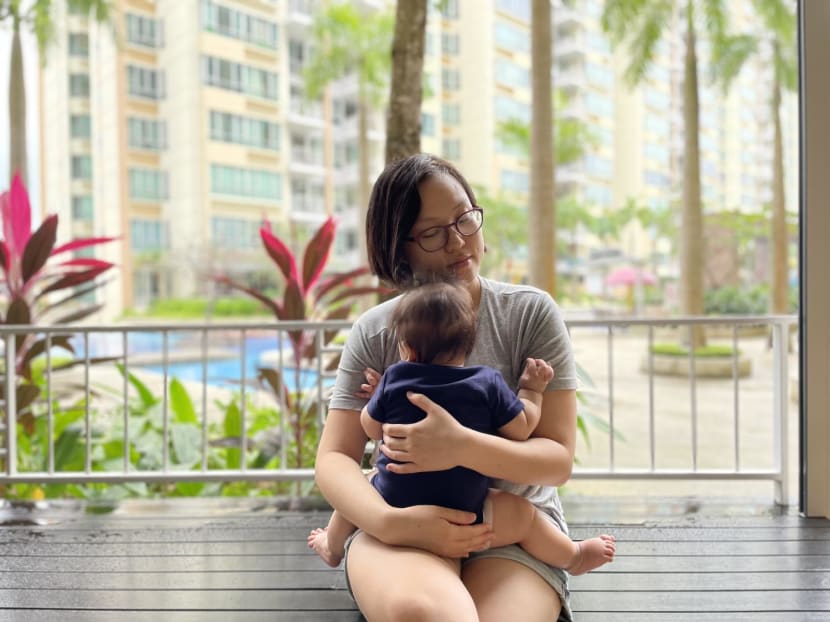Commentary: As a new mother, I struggled to adjust to parenthood as I came to terms with what I was losing
In 2020, four nights after giving birth to my first child, I started getting a strange tightness in my chest whenever I tried to rest.

From 2020 to 2021, Ethel Yap suffered postpartum anxiety which led to severe insomnia and bouts of depression.

This audio is AI-generated.
Common discourse on parenthood typically focuses on what we gain from having a child, such as joy and companionship, but rarely highlights what is lost in the process, such as sleep, money, and even our own dreams. But voicing a view of parenthood that isn’t overwhelmingly positive doesn't make us a bad parent, writes the author — it makes us human.
In 2020, four nights after giving birth to my first child, I started getting a strange tightness in my chest whenever I tried to rest while the confinement nanny or my husband attended to our baby.
This quickly escalated to frequent instances of violent awakenings, heart pounding, gasping for breath, and feeling suffocated.
Despite attempts to sleep while the baby was asleep, the cycle of distress would repeat every few seconds. I was anxious and exhausted all the time.
Being Google-dependent millennials, my husband and I looked up my puzzling symptoms online. Alarmingly, the results suggested a postpartum heart condition that could potentially lead to heart failure, leading us to seek immediate medical attention at KK Women's and Children's Hospital.
I underwent numerous tests and scans on my heart and lungs while my husband anxiously waited, fearing the worst.
A week later, all tests, including those by a cardiologist from the National Heart Centre Singapore, showed no physical issues. I was discharged and referred to KKH’s Mental Wellness Service for postpartum anxiety.
I was relieved that my heart was fine — but the psychiatric diagnosis brought new fears and concerns. Medication and physical rehabilitation could fix most bodily conditions, but mental health recovery seemed much less straightforward.
DEALING WITH DESPAIR AND DREAD
In the next 18 months, my postpartum anxiety led to severe insomnia, which in turn led to bouts of depression. My days were plagued by an unshakeable sense of dread, like a low hum that wouldn’t go away.
I felt worthless and empty, a former shell of myself. I couldn’t recognise myself in the mirror. At my lowest points, I had vivid thoughts of inflicting harm on myself with objects around the house.
I frequently felt like I was outside of my body, observing myself going through the routines of early motherhood from a detached distance.
I knew I loved my son deep inside, but I struggled to experience the warm fuzzy feelings for him that one might associate with maternal love.
I was also plagued with intense anxiety about hygiene, heightened by the ongoing Covid-19 pandemic. I washed my hands so frequently that the skin on my hands was constantly dry and cracking.

Breastfeeding was also a huge challenge, something which I found extremely discouraging.
Having plenty of mum friends who’d had successful breastfeeding experiences, I hadn’t expected to struggle so much in this area. It was yet another millstone around my neck, pulling me deeper into feelings of worthlessness.
Above all, I didn’t expect the intense grief.
I found myself mourning the loss of my former life. My thoughts would regularly drift to what I would be doing in the day if I wasn’t a mother to this baby — and then I would immediately be plagued with guilt.
How could I think these things? This beautiful, healthy child in my arms was conceived with intention. For nine months, we’d sang songs and read stories to my growing belly, decorated his room excitedly and prayed over him lovingly.
Why was I now dreaming of a life where he didn’t exist?
TURNING POINT
Thankfully, I had access to adequate healthcare and loving community support. I already prayed daily, but I also began journalling, and listening to encouraging faith-based podcasts on motherhood.
I relied particularly on the support of my loved ones — friends and community members who held vital space for me in the depths of my darkness.
I started to see a clear turning point after the 18-month mark.
Before that, it had been very difficult for me to verbalise these seemingly shameful thoughts, even to my husband and professional carers like therapists and counsellors. Only after I emerged from the darkest period did I begin to feel able to articulate my struggles.
As a singer-songwriter, I have been using music as a vehicle for years to process difficult feelings and experiences, and express myself.
I conceived my latest song Pills as my own safe space for these difficult feelings, penning them down in lyrics like “Would I do it all again? I’m scared to say I’m not sure”. I hope the song offers the same for parents going through similar experiences to grieve together, and to find the strength and courage to get help and cling on to hope.
One of my dear friends is a mother of two who had suffered from antenatal depression herself.
During those 18 months, when I was at my lowest, she told me something I now realise to be profoundly true: “Motherhood is gain but also loss.”
LETTING GO OF FEAR
Common discourse on parenthood typically focuses on what you gain from having a child — deep joy in simple things, companionship, growth of character and so on — but rarely highlights what people lose in the process — sleep, money, time, and even their own dreams.
Perhaps we fear that voicing a view of parenthood that isn’t overwhelmingly positive makes us a selfish parent, or allows others to label us as such.

Parenthood continues to be an incredibly complex experience for me.
I love my son unendingly, and do not regret having him. He opens entirely new ways of experiencing joy and contentment to me. His presence in my life challenges me to be the best version of myself, so that he can grow up to be the best version of himself.
Yet at the same time, it remains extremely exhausting to continually search to find the balance between attending to myself as an individual with needs and desires, with the inevitable sacrifices every parent must make so that their children have every possible opportunity to soar on their own.
I expect that this tension of gain and loss will be continually present in my journey as a mother, but I no longer fear it.
It’s still a daily challenge — but what helps, aside from consistent self-reflection, is having honest conversations with other parents on how to embrace this tension as an inevitable, even necessary part of parenthood.
Knowing that I can count on the love and support of my family, community and healthcare providers gives me the freedom to express honest and difficult thoughts and feelings about my motherhood without fear of judgement.
This struggle doesn’t make me a bad mother. It makes me a human one.
ABOUT THE AUTHOR:
Ethel Yap is a local singer-songwriter, theatre actress and arts educator. Her latest release Pills is now available on all streaming platforms.
WHERE TO GET HELP:
Samaritans of Singapore Hotline: 1767
Institute of Mental Health’s Helpline: 6389 2222
Singapore Association for Mental Health Helpline: 1800 283 7019








